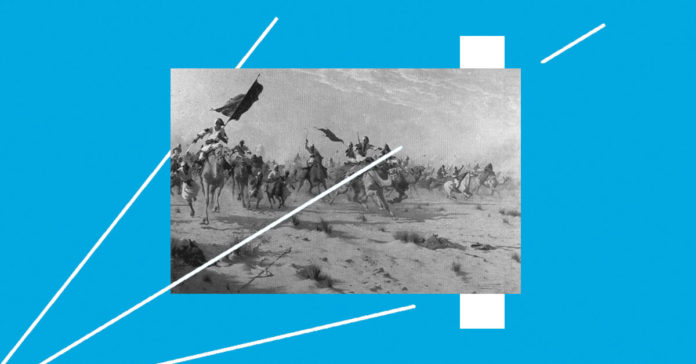Enthusiasm for the After-life endowed the Muslims with almost superhuman courage. Worldly aims and interests having ceased to have any significance in their eyes, they advanced towards the ultimate goal of paradise with great ardency.
It is reported that as Anas ibn an-Nadr, may Allah be pleased with him, advanced on the enemy at a critical moment in the Battle of Uhud, he met Sa’d ibn Mu’adh to whom he said, “By God, Sa’d, I can feel the sweet fragrance of Paradise coming from the direction of the Mount of Uhud.” With these words he rushed into the heart of the battle. Sa’d said that when the dead body of Anas was recovered from the battlefield, there were more than eighty wounds on it. The infidels had literally cut him to pieces; as a result, only his sister could recognize his corpse.[1]
In the Battle of Badr the Prophet ﷺ was urging the Muslims on to greater effort. When he said, “March forward to Paradise, the extensiveness of which is as the extensiveness of the heavens and the earth,” ‘Umair ibn Hamam cried out, “O Prophet of God, is it really that much extensive?” The Prophet ﷺ replied, “Yes. Do you doubt it?” “l doubt not,” said ‘Umair, “l only wished that l attained it.” “You will,” the Prophet ﷺ replied. ‘Umair had taken out some dates and began to eat them. But the opening of the prospect of Paradise before his mind would not let him eat. Was it not foolish to waste one’s time on such “trifles” when heaven was beckoning? He flung away the dates and rushed into the thick of the battle. His heart’s desire was soon fulfilled.[2]
Abu Bakr ibn Abi Musa Ash’ari narrated that on a certain field of battle his father was recounting how the Prophet ﷺ had said that the gates of Paradise were under the shadow of the sword when a man, his clothes in tatters, stepped forward and asked whether he himself had heard that from the Prophet Abu Bakr’s father (Abu Musa Ash’ari, may Allah be pleased with him) replied that it was so. On hearing this, the man went back and took leave of his friends. He unsheathed his sword, broke the sheath into pieces and took the field against the enemy. He was subsequently killed.[3]
‘Amr ibn al-Jamuh, who was lame, had four sons. They used to accompany the Holy Prophet ﷺ whenever he set out on Jihad. When the Prophet ﷺ was leaving for Uhud, ‘Amr wanted to join him, but his sons were opposed to it on account of his physical disability and old age. Finding them adamant, ‘Amr sought the help of the Prophet ﷺ. “My sons dissuade me from going with you,” he said, “while it is my desire that I walk in Paradise with my impaired leg.” The Prophet ﷺ explained that the Jihad was not binding on him. At the same time, he did not like ‘Amr’s sons standing in their father’s way in the holy cause upon which he had set his heart. So he said to them, “Why don’t you let him go? God may grant him martyrdom.” The sons agreed and ‘Amr went to join the holy war and was killed.[4]
Shaddad ibn al-Had says that on a journey a Bedouin came to the Prophet ﷺ and attached himself to his party after embracing Islam. The Prophet ﷺ instructed a Companion to take good care of him. When the campaign of Khayber took place, the Prophet ﷺ gave a share of the booty to the man, but as he was not present – as he was shepperding the cattle of the Muslims – it was kept with a Companion who gave it to him on his return in the evening. The Bedouin took the booty to the Prophet ﷺ and inquired as to what it was. The Prophet ﷺ told him that it was his share of the spoils, upon which he said, “But l did not join you for it,” and pointing towards his throat he added, “I joined to be pierced by an arrow here.” The Prophet ﷺ replied, “God will fulfil your wish if you are true in your affair with Him.” Then another battle took place in which he was killed. When his corpse was pointed out to the Prophet ﷺ, he remarked, “His affair with God was true; so God too made him true.”[5]
[Islam and the World by Shaykh Abul Hasan Ali Nadwi, p.48-49]
Notes:
[1] Bukhari and Muslim.
[2] Muslim.
[3] Ibid.
[4] Zad-ul-Ma’ad, Vol.3, p.135.
[5] Ibid., p. 190.









